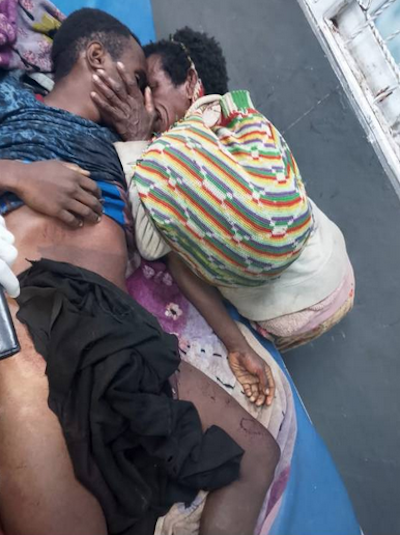Back in March, 29-year-old Maryland man Kilmar Ábrego García—a Salvadoran native who had lived and worked in the United States for nearly half his life—became the face of Donald Trump’s sadistic mass deportation campaign when he was unlawfully sent to CECOT, El Salvador’s notorious mega-prison and torture center.
The US government itself acknowledged that Ábrego García’s removal had transpired as a result of an “administrative error.” However, both the Trump administration and that of Salvadoran President Nayib Bukele—the self-described “coolest dictator in the world”—were huffily opposed to rectifying said error. Ábrego García was at last returned to the US in June, only to now face deportation to…Uganda, the east African country that has been roped into serving as one of numerous international dumping grounds for asylum seekers and undocumented persons who are unwanted in the US.
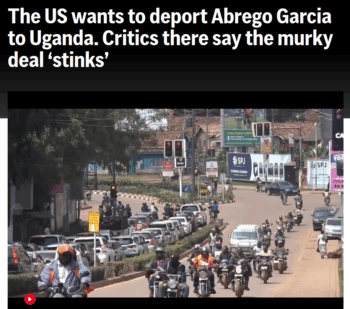
AP (8/26/25) reports that some say an agreement to exile Kilmar Ábrego García to Uganda “stinks”—not because of its violation of human rights law, but because of a “lack of parliamentary approval for the agreement.”
On August 26, the Associated Press selected the following headline for its report on the new twist in the Ábrego García case: “The US Wants to Deport Abrego Garcia to Uganda. Critics There Say the Murky Deal ‘Stinks.’” The article explained that Uganda is not the first African nation to succumb to such agreements with the global hegemon; in July, the US deported five men to the southern kingdom of Eswatini, while eight others were shipped to South Sudan. Rwanda has also promised to accept up to 250 deportees from the US.
The article went on to note that “opposition figures and others in Uganda on Tuesday questioned the lack of parliamentary approval for the agreement”—which is what we are told makes the arrangement “stink.” And yet the AP did not find it necessary at any point to mention the sheer illegality of such “third country” deportation schemes, which happen to constitute a violation of international law—in other words, the “stink” is a whole lot bigger than we are led to believe.
As noted in an April United Nations press release on “illegal deportations” from the US to El Salvador:
The international law duty of non-refoulement prohibits deporting any person to a place where there is a substantial risk of arbitrary deprivation of life, torture and/or cruel, inhuman or degrading treatment or punishment, enforced disappearance, arbitrary detention, unfair trial or other irreparable harm.
The US State Department’s 2024 writeup on human rights practices in Uganda included “credible reports of: arbitrary or unlawful killings; disappearances; torture or cruel, inhuman, or degrading treatment or punishment; arbitrary arrest or detention,” and much more.
Fantastically unsafe destinations
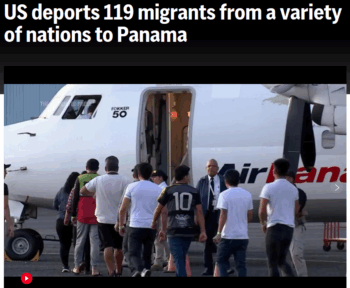
“The Trump administration takes Panama up on its offer to act as a stopover for expelled migrants,” AP (2/13/25) reports without a hint of criticism.
Indeed, a common denominator running through the list of ostensible “safe third-country” destinations for US deportees—from Eswatini and South Sudan to Honduras and Guatemala—is that they are fantastically unsafe. The US government has warned its own citizens against travel to South Sudan “due to crime, kidnapping and armed conflict”; Honduras and Guatemala both produce significant numbers of refuge seekers themselves, precisely on account of sky-high levels of violence, much of it owing to decades of pernicious US meddling.
And while US corporate media have not shied away from reporting on the third-country deportations, they tend to dance around the illegality of the whole matter—not to mention the fact that it is batshit crazy. Imagine for a moment that you are a refuge seeker who has risked your life to reach the US, only to wake up one day and find yourself in a country where you don’t speak the language, and perhaps have never even heard of in the first place—with nothing to protect you from “irreparable harm.”
In February, AP (2/13/25) reported on the deportation of the first batch of 119 migrants, from Afghanistan, China and an array of other nations, to be deported from the US to Panama—as if it were the most normal thing in the world for a Central American country to be acting as an intermediary for the illegal expulsion of refuge seekers with no criminal record.
The report mentioned that since Panamanian President José Raúl Mulino took office in 2024, “Panama has made dozens of deportation flights, most funded by the US government.” Many of the almost 300 migrants ultimately sent to Panama by the US were effectively incarcerated in the country’s Darién region bordering the notorious Darién Gap, the veritable migrant graveyard that hundreds of thousands of refuge seekers have been forced to traverse in recent years in the hopes of reaching safety in the US.
Relying on ‘critics’
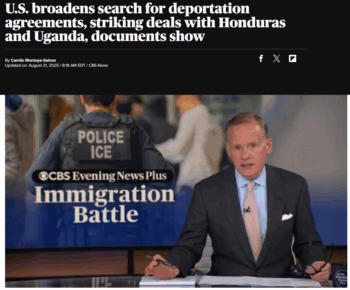
CBS (8/21/25) begins a story by reporting that the Trump administration is persuading “countries around the world to aid its crackdown on illegal immigration.” Three paragraphs later, we learn that that administration is actually “rerout[ing] asylum-seekers to countries that” it claims “can fairly hear their claims for humanitarian protection.”
Of course, corporate media have never been known for empathy, and so, instead of painting a picture of the acute human plight occasioned by illicit and ludicrous US policy, journalists rely on a variety of “critics” to call out what should be objectively condemned by anyone supposedly in the business of speaking truth to power.
A recent CBS News dispatch (8/21/25), for example, specified that
human rights advocates have strongly denounced the Trump administration effort, saying migrants could be deported to countries where they could be harmed or returned to the place they fled.
The CBS article noted that the US government is pursuing a “large-scale diplomatic effort…to strike deportation arrangements with nations across several continents, including those with problematic human rights records.”
A similarly noncommittal approach was taken in a July Washington Post piece (7/4/25) on the “imminent deportation to conflict-ridden South Sudan” of eight men from Cuba, Laos, Mexico, Myanmar, Sudan and Vietnam—whose authors dispassionately observed, “Lawyers for the migrants said it is illegal and immoral for the US government to deport people to places where they could be killed.”
‘Uniquely barbaric’
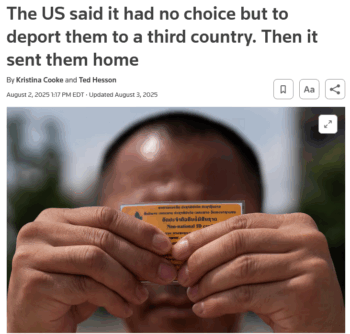
Reuters (8/2/25) quoted Trump officials calling deportees “the worst of the worst” and “heinous illegal criminals.”
In early August, Reuters (8/2/25) calculated that, since Trump’s reassumption of the presidency in January, there had already been thousands of third-country deportations to Mexico, and hundreds to other countries. The aforementioned five-man deportation in July to Eswatini—which comprised individuals from Cuba, Jamaica, Laos, Vietnam and Yemen—was praised by Department of Homeland Security Assistant Secretary Tricia McLaughlin as a “safe third-country deportation flight [that] took individuals so uniquely barbaric that their home countries refused to take them back.”
And while Eswatini hardly qualifies as safe, “uniquely barbaric” would seem to be a pretty good description of current US policy. In her social media post on the five “depraved monsters” who had been “terrorizing American communities,” McLaughlin listed some of the crimes attributed to them—murder, robbery, “operating a motor vehicle under influence of controlled substance”—which, while certainly constituting criminal acts, are not exactly singularly barbaric. In fact, America’s ongoing habit of bombing civilians left and right across the globe—most recently including 11 alleged drug smugglers murdered in cold blood—could be perceived as rather more barbaric than, I dunno, driving under the influence.
Furthermore, as former US ambassador to Bulgaria Eric Rubin has pointed out (New York Times, 6/25/25), the Trumpian project of expelling folks to countries they have nothing to do with is an exercise in “terrorizing people…. Most of the people we’re talking about have not committed any crime.”
As for the alleged “refusal” by home countries to take their “monsters” back, this claim doesn’t really hold water, either. For instance, when Trump kicked off the eight-man South Sudan deportation that included one Mexican citizen, Mexico’s President Claudia Sheinbaum said her government had not even been informed (Reuters, 8/2/25).
Shameless racist bullying

The New York Times (6/25/25) frames US coercing countries to participate in human rights abuses as “global deal-making”—just the way Donald Trump would want it described.
In June, meanwhile, a New York Times would-be exposé (6/25/25) headlined “Inside the Global Deal-Making Behind Trump’s Mass Deportations” shone a bit of light on how the US administration was “pushing nations around the world, including ones at war, to take people expelled” from the land of the free. Rwanda, for one, was said to appear “eager” at the prospect, after the US paid the former genocide-afflicted nation $100,000 in April to accept one Iraqi citizen.
Of a total of at least 58 countries that US diplomats had been instructed to approach as possible deportee dumping grounds, many had already been subjected to—or were contenders for—“a new full or partial travel ban to the United States by the Trump administration.”
Alluding nonchalantly to the administration’s shameless racist bullying, the Times brought up a State Department cable that “instructed diplomats to tell the countries being considered, most of which are in Africa, that they might be able to stay off the list if they agreed to take deportees who are not their citizens.” The paper went on to apply egregious euphemism to an utterly sociopathic spectacle:
At a cabinet meeting, Secretary of State Marco Rubio spoke with passion about the process: “We are working with other countries to say, ‘We want to send you some of the most despicable human beings to your countries, and will you do that as a favor to us?’”
Again, it seems the US newspaper of record might have conjured a slightly more valid assessment of Rubio’s performance than one of “passion”—his own “despicable” would have been more appropriate. The article’s authors proceeded to allow the usual space for “critics of the deportations and lawyers” to argue that “the administration is ignoring the potential for human rights abuses in some of the countries willing to play host.”
Then comes the roundabout, watered-down verdict:
That appears to be the point. Administration officials say they are trying to send a message to those in the United States illegally that they could end up in brutal conditions in a faraway land if they don’t leave voluntarily.
One of the “faraway lands” listed as being targeted for a third-country agreement was Libya, which as the American Civil Liberties Union (6/6/25) has noted is “known for electrocuting and sexually assaulting migrants imprisoned in militia-run detention facilities.”
Don’t connect the dots
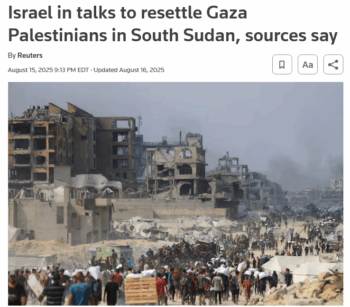
“Resettle” (Reuters, 8/15/25) sounds so much better than “ethnically cleanse.”
And this is basically the corporate media template for reporting on the blatant violation of human rights and international law: Go ahead and admit that the US government is consciously and intentionally setting refuge seekers up to “end up in brutal conditions,” but don’t bother dwelling on where that slippery slope might lead us all, or connecting the dots between illegal third-country deportations and Trump’s current mission to do away with the law altogether. (It is ironic, to say the least, that an administration so obsessed with going after “illegals” is committed to entirely illegal behavior.)
Nor, to be sure, are media concerned with exploring the implications of the racist, imperial hubris that causes the US to view much of the world—and African nations in particular—as potential carceral colonies. As coincidence would have it, America’s megalomaniacal partner in crime, the state of Israel, is also reportedly seeking to “resettle” the native Palestinian population of the Gaza Strip in—where else?—South Sudan. As per the typically disingenuous language of a recent Reuters writeup (8/15/25):
The plan, if carried further, would envisage people moving from an enclave shattered by almost two years of war with Israel [read: US-backed genocide by Israel] to a nation in the heart of Africa riven by years of political and ethnically driven violence.
By further coincidence, Israel in 2013 signed a secretive deal under which African asylum seekers in the country were deported to Rwanda and disappeared. But, hey, surely it’s become a “safe third country” in the meantime.
In June, CBS (6/24/25) reported on the Supreme Court’s
lift[ing of] a lower court order that prevented the Trump administration from deporting migrants to countries that are not their places of origin without first giving them the chance to raise fears of torture, persecution or death.
The article quoted Justice Sonia Sotomayor’s dissenting opinion that the court was “rewarding lawlessness” and undermining due process. And as the corporate media tiptoe around reporting on this lawlessness, they may be rewarding just that, as well.
This post was originally published on FAIR.







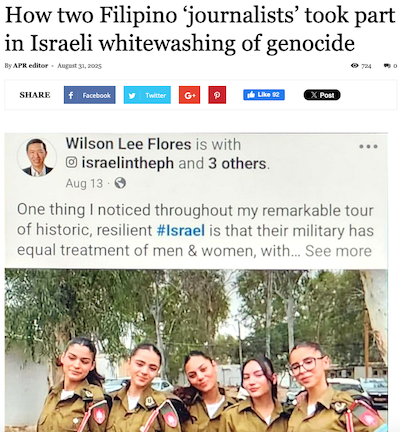
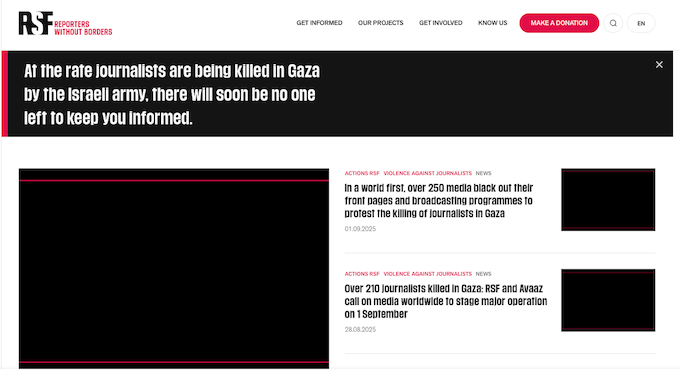
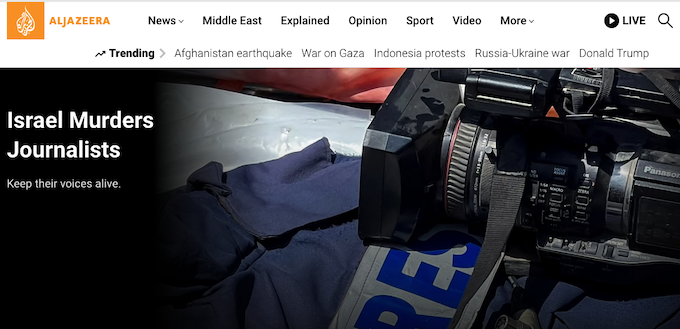
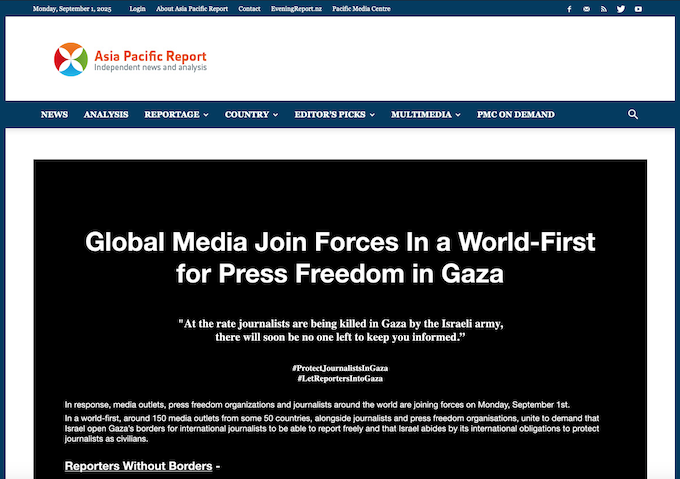
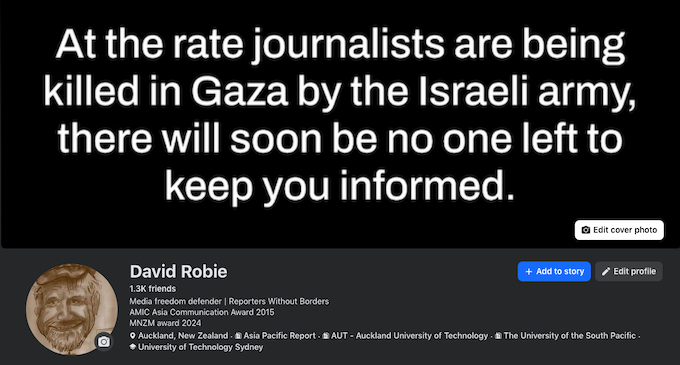


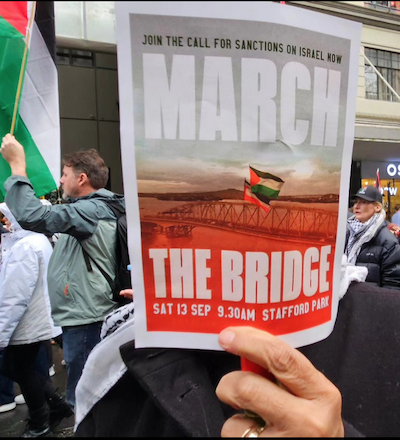

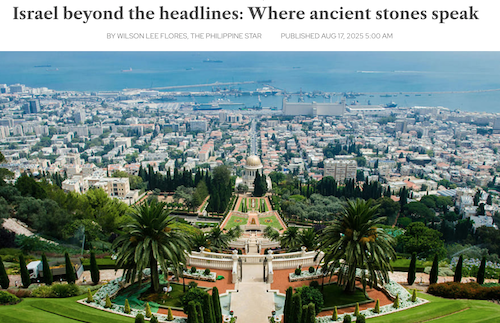



 Why NZ Prime Minister Luxon got it wrong. Video: RNZ
Why NZ Prime Minister Luxon got it wrong. Video: RNZ Mapping the success of Zionist ethnic cleansing of Palestine.
Mapping the success of Zionist ethnic cleansing of Palestine.
